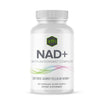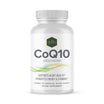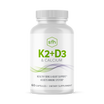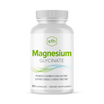*DISCLAIMER* For years, the scientific literature has suggested that omega-3 fats, such as EPA and DHA, may have anti-inflammatory properties. It is important to understand that the FDA has not approved omega-3 fats as anti-inflammatory agents. Commonly, science is years ahead of the approval of a therapeutic by the FDA. In the case of natural products, this may never happen because natural products are hard to patent and the pharmaceutical industry will not spend the $100+ million that is needed to do a rigorous, well-designed, clinical study. This blog reports a very interesting result based on a multi-generation health study conducted in Massachusetts.
We’ve known for a long time that omega-3 fatty acids are anti-inflammatory powerhouses and that they’re crucial nutrients that play a variety of roles in supporting heart and brain health. But in an incredibly exciting new development, a recent study published in the journal Nutrients in June 2022 has shown that there’s a promising correlation between having higher levels of DHA and a lower risk for the development of Alzheimer’s disease!
Here’s what the study found, and why we’re so excited about how we can use this information in the fight against Alzheimer’s and other neurodegenerative disorders.
A quick intro to omega-3s
Omega-3 fatty acids are a type of healthy polyunsaturated fatty acid (PUFA) that play a variety of anti-inflammatory and supportive roles in the body. They’re especially important for your cardiovascular and central nervous system (in other words: your heart and your brain).
While there are several kinds of omega-3s out there, two of the most important kinds to know about are eicosapentaenoic acid (EPA) and docosahexaenoic acid (DHA for short). Both EPA and DHA are thought to play protective anti-inflammatory roles in your body. In addition, DHA is an integral kind of fat found in your brain cells that helps with both its development and its function. And as more and more research is starting to show, it may be a critical factor for supporting your brain, especially as you age.
The study
This study, led by Dr. Aleix Sala-Vila of the Fatty Acid Research Institute, aimed to understand the correlation between DHA status and the risk of developing Alzheimer’s disease, a severe neurological disorder and form of dementia that progressively impairs memory, behavior, and cognitive abilities.
To do this, they conducted a prospective observational study within the Framingham Health Study, an ongoing population-based study among participants in Framingham, Massachusetts. A total of 1,490 eligible participants were evaluated in this study, all of whom were dementia-free American adults over the age of 65.
In the study, researchers took blood samples from each participant to measure the levels of DHA in their blood. They then followed up with participants after several years (up to 14 years total, but with an average median of 7.2 years between the initial DHA measurement and follow-up). In the follow-up, researchers looked for Alzheimer’s disease, as well as all-cause dementia and other neurological events.
After the follow-up, a total of 131 cases of Alzheimer’s disease were documented after this follow-up.
Key findings
One of the biggest findings from this study was that the people who had the highest levels of DHA in their blood were significantly less likely to have developed Alzheimer’s disease than people with the lowest levels of DHA. In fact, the researchers found that the participants with a baseline of DHA above 6.1% (the top quintile) had nearly half the risk of developing Alzheimer’s Disease than those with a DHA level below 3.8%, the bottom quintile!
In other terms, the researchers concluded that these high levels of DHA translated to a gain of 4.7 years free from the development of Alzheimer’s disease.
In addition to their overall analysis, researchers also took a close look at people who carry the allele Apolipoprotein E (APOE4), a gene that has previously been found to be the strongest risk factor for developing Alzheimer’s besides age. In this study, they found that people who carried the APOE4 gene showed a greater benefit in DHA than people who do not carry the gene, suggesting an exciting role in the prevention of Alzheimer’s even in people who are genetically predisposed to developing it.
TL;DR: Higher levels of DHA were found to be inversely associated with risk for both Alzheimer’s and all-cause dementia, suggesting that increasing omega-3 intake could play a huge role in supporting overall brain health and delaying neurological decline in certain populations!
How to get more omega-3s in your diet
Omega-3 fatty acids are present in a variety of foods, both plant- and animal-based. However, DHA is best found in fatty, cold-water fish. In fact, the American Heart Association recommends that you get at least two servings of fish every week in part because of their valuable omega-3 stores.
But what if you don’t eat enough fatty fish in your daily diet (as a whopping 80-90% of the American population doesn’t)? The next best way to get the beneficial omega-3s in your diet is with a fish oil supplement! But, be aware as not all fish oil supplements are created equal, sourcing and quality matter.
SFH’s omega-3 supplements are made with wild-caught Alaskan Pollock (no fish farms here!) and are processed using molecular distillation, making it possible to concentrate high amounts of DHA and EPA. Our Super Omega-3 + Vitamin D3* delivers a staggering 4800mg Omega-3 and 3500mg EPA & DHA in just one teaspoon, plus we add 1000IUs Vitamin D3 for a one-stop supplement. Or, check out our Super Omega-3 Fish Oil Gel Caps*, just two gel caps dole out 2000mg Omega-3 and 1800mg EPA & DHA. We wrap our liquid gold in enteric coating to maximum gastrointestinal absorption and minimize unpleasant “fish burps.”
If you are curious about your exact omega-3 levels, this Omega-3 Index Complete Test from Omega Quant not only shows your overall omega-3 index but also breaks down all fatty acid content, so you can hone in on your EPA and DHA levels individually. It’s best to test every four months to track your results from diet or supplementation changes.
The bottom line
Omega-3 fatty acids are proving to be a hugely important factor for supporting your brain health through all stages of life. With Alzheimer’s disease ranked as the sixth leading cause of death in the United States, this study that shows a connection between DHA status and dementia risk points us in a promising direction for how nutritional interventions can keep our brains healthy and happy for the long run.
*These statements have not been evaluated by the Food and Drug Administration. These products are not intended to diagnose, treat, cure or prevent any disease.
Meet the Author

Erica Digap is a science-minded copywriter specializing in evidence-based nutrition science, fitness, and health content. After receiving her Bachelor of Science in Clinical Nutrition from the University of California, Davis, and working as a consultant and director in the corporate diet industry for many years, she decided to set forth and use her experience and expertise to inspire readers to make lasting, healthy lifestyle changes – one nutritious meal and workout at a time.





















Leave a comment
This site is protected by hCaptcha and the hCaptcha Privacy Policy and Terms of Service apply.